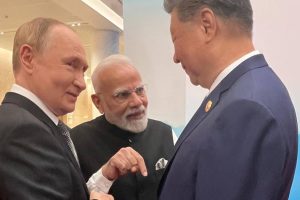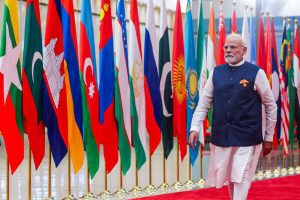Prime Minister Narendra Modi and Chinese President Xi Jinping, during their bilateral meeting in Tianjin on Sunday, underlined the crucial role of India and China’s economies in stabilising global trade, the Ministry of External Affairs (MEA) said in a statement.
The meeting comes against the backdrop of rising global trade tensions triggered by US President Donald Trump’s tariff hikes, which an American appeals court has recently ruled as “illegal.” In April, Washington imposed sweeping tariffs on nearly 60 countries and trade blocs, including a 50 per cent levy on India—with an additional surcharge for its purchase of Russian crude oil—and up to 30 per cent on China, sparking a tariff war that escalated to as high as 245 per cent before a temporary pause.
According to the MEA, Modi and Xi agreed that India-China trade relations must be guided by a political and strategic vision aimed at expanding bilateral investment, addressing trade imbalances, and contributing to global economic stability.
Both leaders also placed emphasis on strengthening people-to-people ties through direct flight connectivity, visa facilitation, and the resumption of the Kailash Mansarovar Yatra. These initiatives build on recent agreements reached during Chinese Foreign Minister Wang Yi’s visit to India earlier this month.
The two leaders further stressed that India-China relations should be seen independently of third-country perspectives, with both nations pursuing strategic autonomy. They called for broader cooperation on regional and global issues, including terrorism and fair trade practices in multilateral forums.
Prime Minister Modi is also set to meet Russian President Vladimir Putin on the sidelines of the Shanghai Cooperation Organisation (SCO) Summit, which begins later today. The SCO currently comprises 10 members, including India, China, Russia, Pakistan, and Central Asian states, along with dialogue partners and observers.




